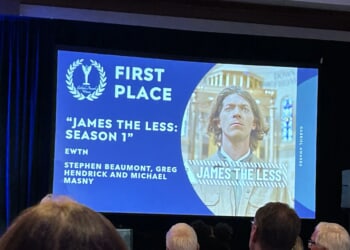Liam Downer-Sanderson is a graduate of Georgetown University and a former local council candidate.
Walk through Paris at midnight and cafés are alive with conversation. In Berlin, the night is just beginning. Even in cities across Eastern Europe, nightlife is treated as a public good – something that adds colour, character, and economic value to urban life.
London, by contrast, is slowly becoming a city afraid of itself after dark.
Despite being one of the world’s great capitals, London’s nightlife is being smothered—by heavy-handed local authorities, outdated licensing laws, and a small but vocal group of residents who seem to think city living should come with countryside silence.
As a communications consultant working on planning and licensing applications, I’ve seen first-hand how broken the system is. Applications for new venues are buried in red tape; operators who follow the rules and engage with communities are still subject to arbitrary decisions; one or two objections (often based on speculation) can derail an entire proposal.
Entrepreneurs are left hanging, even after doing everything right. Licensing sub-committees can be unpredictable, with outcomes shaped more by local politics than by merit. That sort of uncertainty discourages innovation, kills investment, and undermines our economy before a single drink is poured or a table is served.
In my own borough of Hammersmith and Fulham, Fulham Broadway is a case in point. The historic Broadway Bar and Grill, dating back to the 1600s, was shut down after repeated noise complaints from a single resident who chose to live above the bar. That building has now changed hands several times. A new venue has opened, but how long until it faces the same problems?
This isn’t an isolated story. And the result is a chilling effect across the capital. London’s night-time economy, once worth over £26bn and supporting more than a million jobs, is being hollowed out,not by market failure, but by policy failure.
As Conservatives who want to see growth and enterprise thrive, we should be part of the solution.
This month, the Government announced a welcome first step: giving the Mayor of London powers to challenge boroughs that block late-night licences in key areas. It’s a recognition that overregulation is damaging our night-time economy. But these powers are limited and reactive. We need something bolder and more structural.
Rather than firefighting poor decisions, the Mayor should be empowered to designate Nightlife Zones – areas around high streets and town centres where later hours, music, and outdoor dining are not just permitted but actively encouraged. With proper designation, both businesses and residents would know what to expect. It would bring clarity, reduce conflict, and allow vibrant areas like Fulham Broadway or to fulfil their potential.
This isn’t just an idea for inner London. Every borough has at least one high street, junction, or commercial hub that could support a more vibrant evening economy. Whether it’s a suburban town centre or a transport-linked crossroads, nightlife could thrive – if we let it.
This isn’t just about culture, it’s about affordability too. The few venues that do survive in London are becoming expensive. Socialising is starting to feel like a luxury. A more competitive and diverse night-time economy would bring prices down, support happy hours and early-evening offers, and make going out feel normal again.
We also need to modernise the licensing framework. Right now, licensing decisions can consider only four narrow objectives: crime, safety, nuisance, and child protection. There’s no requirement to consider economic or cultural benefit. That needs to change. Councils should also consider what might go right—jobs created, community value, local vibrancy.
Licensing also lags behind planning reform. Since 2018, the Agent of Change principle has been part of the National Planning Policy Framework, requiring developers to mitigate noise when building near venues. But it doesn’t apply to licensing; that gap leaves businesses vulnerable. The Culture, Media and Sport Committee is right to call for the principle to be enshrined in law.
If we’re serious about supporting nightlife, we also need to move beyond symbolism. London has had a night czar since 2016 – but while the role has visibility, it lacks real power. The creation of a Nightlife Taskforce this year is welcome, but we need proper authority.
A Night Mayor, with statutory powers, a cross-borough remit, and a real budget, could finally give London’s nightlife a voice where it matters. We don’t need to turn London into Berlin. But we must stop pretending it’s a village. A world-class city shouldn’t switch off at 10:30pm.
As Conservatives, we believe in aspiration, enterprise, and freedom under the law. We back people who want to work hard and build something, from a local bar to a creative business. That means standing up to overregulation, not retreating behind it.
If we want a thriving, liveable, culturally rich London, we must give it the space to breathe – and the freedom to stay open. Because when the lights go out on a city’s nightlife, it’s often a sign the soul is going with it.


![Stephen Miller Announces New Goal for ICE Mass Deportation Effort [WATCH]](https://www.right2024.com/wp-content/uploads/2025/05/Stephen-Miller-Announces-New-Goal-for-ICE-Mass-Deportation-Effort-350x250.jpg)


![Simone Biles Defends Trans Pitcher and Mocks Riley Gaines, It Doesn’t Go Well [WATCH]](https://www.right2024.com/wp-content/uploads/2025/06/Simone-Biles-Defends-Trans-Pitcher-and-Mocks-Riley-Gaines-It-350x250.jpg)

![LAPD Praises 'Peaceful' Rioters as They Set Cars on Fire and Attack Feds [WATCH]](https://www.right2024.com/wp-content/uploads/2025/06/LAPD-Praises-Peaceful-Rioters-as-They-Set-Cars-on-Fire-350x250.jpg)

![Fans Shocked as Katy Perry Stops Concert After She’s Ambushed by Deranged Fan Onstage [WATCH]](https://www.right2024.com/wp-content/uploads/2025/06/Fans-Shocked-as-Katy-Perry-Stops-Concert-After-Shes-Ambushed-350x250.jpg)
![LA Protest Casualty? Dead Body Found as Riots Stretch Into Fifth Night [WATCH]](https://www.right2024.com/wp-content/uploads/2025/06/1749642627_LA-Protest-Casualty-Dead-Body-Found-as-Riots-Stretch-Into-350x250.jpg)






